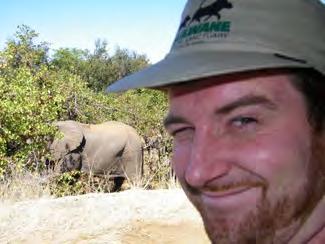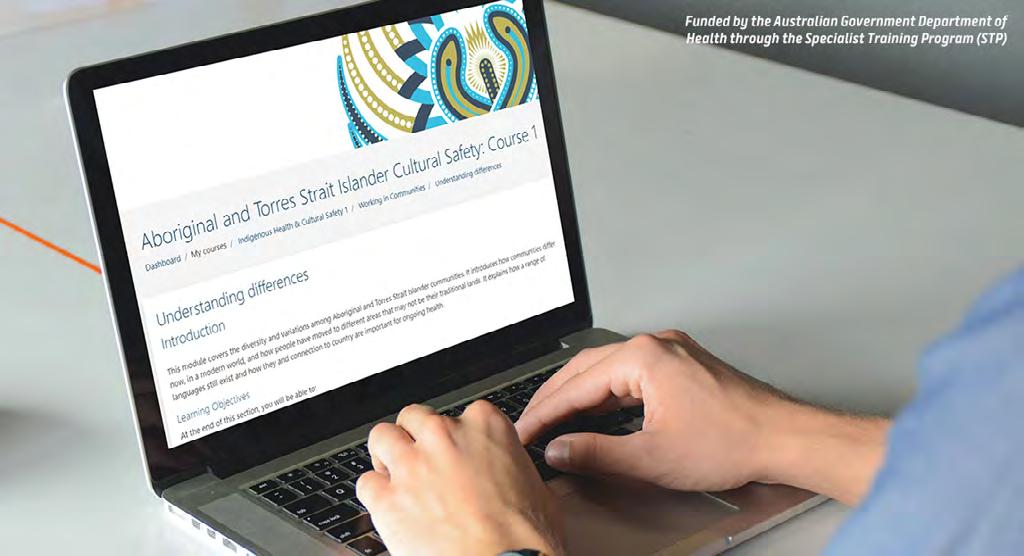
5 minute read
Building rapport with patients is key to success for new Indigenous surgeon
A childhood split between Australia and South Africa provided Dr Andrew Martin with an appreciation of difference. He brings this to his work as an Ear, Nose and Throat (ENT) surgeon. Dr Martin lived in South Africa between the ages of nine and 14 during a tumultuous time in the country’s history, towards the end of apartheid and the beginning of Nelson Mandela’s presidency. “It was very confronting to see what was happening in South Africa. But being an Indigenous Australian gave me sympathy for what people were going through,” he says. As a new Fellow with RACS, Dr Martin attributes his understanding of the value of cultural sensitivity to this experience, combined with his Indigenous heritage, and his time living and travelling internationally. RACS is working to ensure more Indigenous Australians have the opportunity to become Fellows. RACS launched its Indigenous Surgical Pathway Program Australia in August 2021 to increase Aboriginal and Torres Strait Islander surgeons in the workforce. Dr Martin says his journey towards Fellowship has been long and challenging but rewarding. “Training is a very long journey, so you have to really enjoy the journey and not be too obsessed with the result.”
Before moving to South Africa, he spent his younger years in Benalla in the north of Victoria.
Advertisement
He attended high school in Frankston, Melbourne, and enrolled in Pharmacy at Monash University, where he completed an honours year researching medicinal chemistry. However, his ultimate ambition was to become a surgeon and he embarked on a four-year post graduate degree in Medicine at the University of Queensland. He completed his surgical training in Aotearoa New Zealand, where he lived for seven years. This year he moved back to Australia to start his Fellowship in Head and Neck Surgery. Dr Martin says that the hard work of surgical training is part of a journey that is satisfying not just in its destination, but also in itself.
“Overall, I think it’s a hugely positive experience, with a number of stressors and challenges along the way. There are a lot of hurdles to jump over with training and exams, and life can throw you curve balls that are not always timed to fit in with your plan. “Training is a very long journey, so you have to really enjoy it and not be too obsessed with the result. I made a lot of great friends and mentors in training— this is what made for an awesome experience.” Dr Martin encountered a hurdle of a different kind during the year, when he and his family contracted COVID-19 and he found himself isolating at home with his wife and three children. Fortunately, he and his wife had been vaccinated and the family only suffered mild symptoms. But it did mean that Dr Martin was responsible for some homeschooling of his young children. “It was definitely a challenge!” he says. Spending time with his family and his love of the natural world, ignited amid the bounteous wildlife of Africa, provide him with respite from the stress of his job. He considers his birdwatching hobby to be an obsession, something he was able to indulge in during a trip to northern Spain following an Ear Surgery course and while training in New Zealand. Dr Martin also gets great satisfaction from helping a wide range of patients—an element of his specialty that originally attracted him to pursue a career in ENT surgery. “What I love about ENT is the variety of people you treat, from babies to older people. I also see a variety of conditions, from hearing problems to cancer or sinus surgery. I get great satisfaction from the whole patient experience—from seeing people in the clinic, operating on them and their follow up. It gives me a buzz when I see people who have achieved a good result.” In his surgery career, Dr Martin believes communication is more than half of the job and that building a successful relationship with patients is crucial to the role.
“The most important thing is to try to understand and bond with those who have a different background. Learning some phrases or words from their language and having a broad understanding of their cultural norms helps you develop a rapport with them. But essentially, it is always important to treat each person as an individual.”
eLearning courses
As part of the new Surgical Competence and Performance Framework, RACS has acknowledged the importance of surgeons being culturally competent and culturally safe. This is reflected in the new dedicated 10th Cultural Competence and Cultural Safety Competency. This competency includes points related to improving Indigenous Health outcomes, providing culturally competent and safe care, fostering respectful relationships, and promoting inclusive and safe workplaces. To support delivery of the new competency, Fellows, SIMGs, Trainees and JDocs can undertake the Aboriginal and Torres Strait Islander eLearning courses. These courses have been developed with the surgeons’ requirements in mind, and designed and developed in collaboration with Indigenous partners to ensure they provided an authentic Indigenous perspective. More information about the courses and how to access to them is available through the RACS Indigenous Health webpage section (https://bit.ly/3l354nD). The courses are designed to be completed in self-contained 30-minute modules, and members will be issued a certificate on completing the full course along with 10 hours of CPD for the new Cultural Competence and Cultural Safety Competency. The courses can be used each year towards the CPD requirements for the Learning Plan related to the new competency. These courses have been specifically designed to introduce members to life prior to colonisation—the process and impact of historical and modern-day colonisation. The courses also provide a range of information about supporting working in communities, effective communication, men’s and women’s business, and the impact racism has on health outcomes. The final section of the course is focused on healthcare outcome challenges and options to improve delivery. To support delivery of the eLearning courses the RACS library has purchased access to a range of online and hard-copy books for members to use, and these are linked into the course pages. The RACS library page provides access to the Informit—Indigenous database along with a range of suggested articles, books, and other relevant resources for Australia and New Zealand. For more information please contact the RACS Indigenous Health team.

Funded by the Australian Government Department of Health through the Specialist Training Program (STP).











